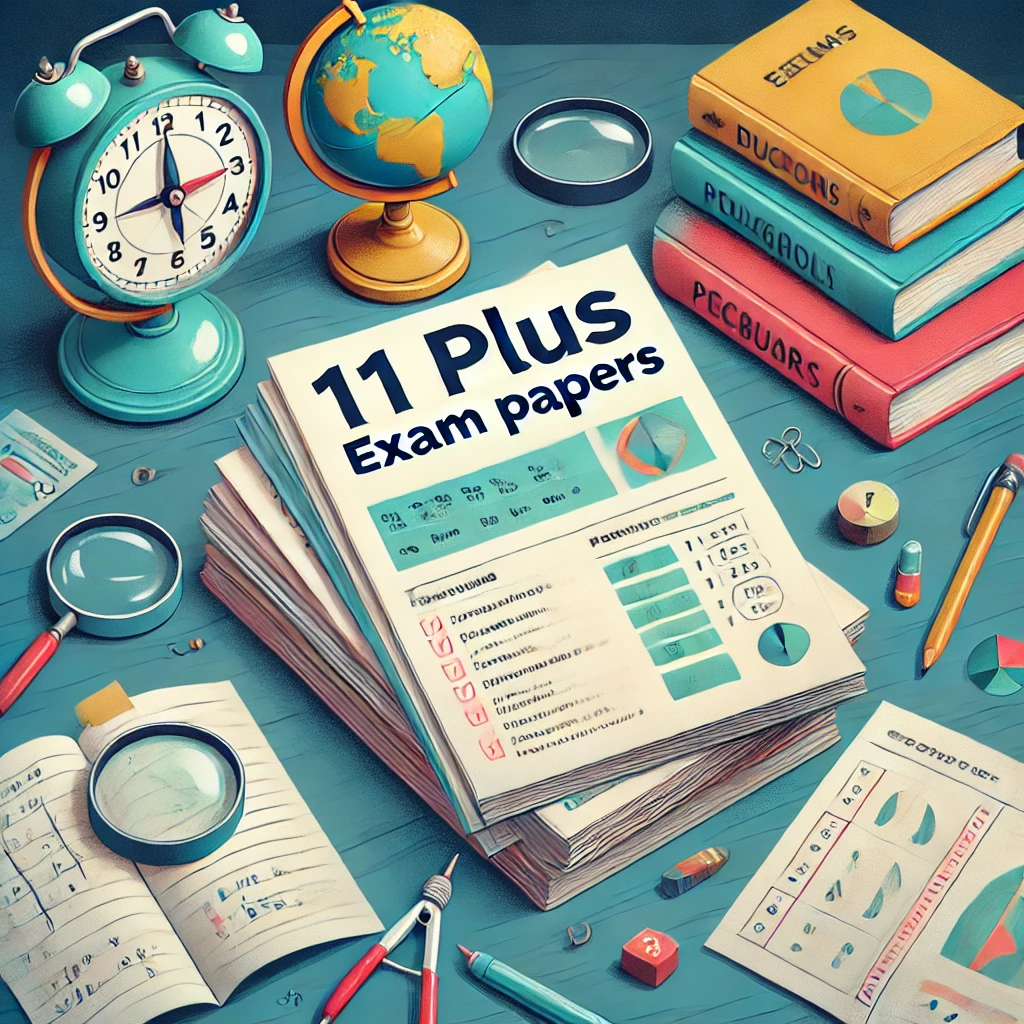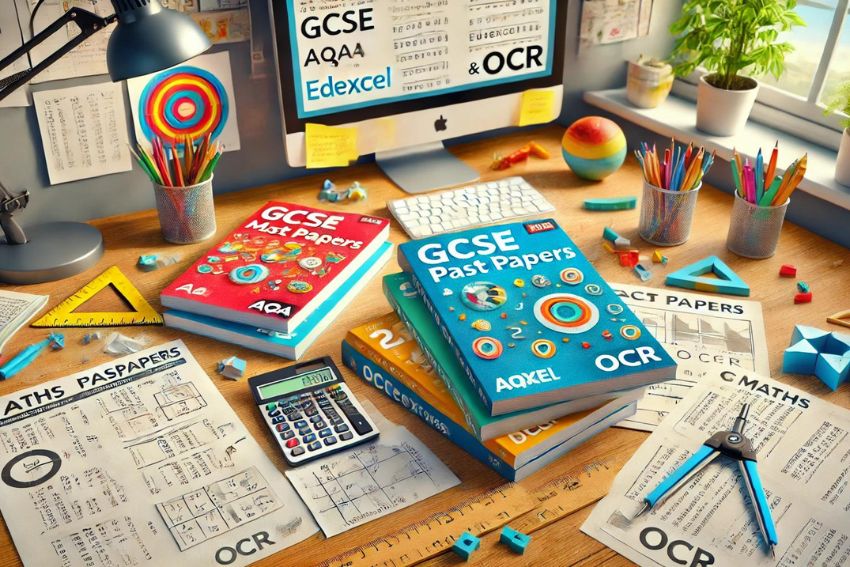The 11 Plus exams are more than just a test—they are the gateway to some of the most prestigious grammar schools in the UK. Securing a place at these top institutions can set a child on a path of academic excellence, opening doors to opportunities that can shape their future.
In this comprehensive guide, you’ll gain a deep understanding of what 11 Plus exam papers entail, how to effectively prepare your child for them, and the best resources available to ensure success. Whether you’re just beginning the preparation journey or looking to fine-tune your approach, this blog will provide you with the insights and strategies needed to help your child excel.
We’ll cover the four critical areas assessed in the 11 Plus exams: Verbal Reasoning, Non-Verbal Reasoning, Maths, and English. Each section plays a vital role in evaluating different skills, and understanding these can be the key to mastering the exams.
What Are 11 Plus Exam Papers?

The 11 Plus exam papers are a series of tests administered to students in Year 6, typically aged 10 or 11, as part of the selection process for grammar schools and some independent schools in the UK. These papers assess a child’s academic abilities in key areas, including Verbal Reasoning, Non-Verbal Reasoning, Mathematics, and English. The goal is to evaluate whether a student has the potential to thrive in a more academically rigorous environment.
The 11 Plus exams have a long history in the UK, dating back to 1944 when they were introduced as part of the Education Act. Initially, the exams were designed to determine which type of secondary education a child would pursue—grammar school, technical school, or secondary modern school. Over time, the 11 Plus evolved, with the focus shifting primarily towards grammar school entry. Although the exam is no longer mandatory across the UK, it remains a key element in the admission process for many grammar schools, particularly in areas like Kent, Buckinghamshire, and Northern Ireland.
For students aspiring to enter grammar schools, performing well on the 11 Plus exam papers is essential. These exams are highly competitive, with many more students applying than there are available places. A strong performance can secure a place at a grammar school, which is often associated with high academic standards, excellent facilities, and enhanced opportunities for future educational and career success. The 11 Plus exams are, therefore, a critical stepping stone for students aiming to attend some of the best schools in the UK.
Types of 11 Plus Exam Papers
There are various types of 11 Plus exam papers, each designed to test different skills and abilities. These papers typically cover subjects such as Maths, English, Verbal Reasoning, and Non-Verbal Reasoning, with each section assessing a child’s understanding and problem-solving skills. Understanding the different types of 11 Plus exam papers is key to effective preparation, helping students to focus on areas where they need improvement.
Standard Format
The standard format of 11 Plus exam papers requires students to write their answers directly onto the question paper. This format is often more traditional and allows students to work through problems in a linear manner, showing their working-out and thought processes. Questions in this format can vary in style, including short answers, problem-solving tasks, and longer, more complex questions that require detailed responses.
The standard format is commonly used in many regions that still administer the 11 Plus, particularly in certain grammar schools across the UK. It is more prevalent in areas where schools prefer to assess a student’s ability to articulate and develop answers in a written form, rather than relying solely on multiple-choice selections.
Multiple Choice Format
The multiple choice format of 11 Plus exam papers presents students with a series of questions, each accompanied by several possible answers. Students must select the correct answer from the options provided, usually by marking a corresponding box. This format is often faster-paced, requiring students to make quick decisions, and it is easier to mark, as answers are straightforwardly correct or incorrect.
Multiple choice exams are widely used by schools that work with GL Assessment and CEM (Centre for Evaluation and Monitoring), which are two of the main exam boards for the 11 Plus. This format is popular in regions such as Kent and Buckinghamshire, where large numbers of students sit for the exams, and the efficiency of multiple choice marking is advantageous.
Pros and Cons of Each Format
- Standard Format:
- Pros: Allows students to demonstrate their working process, better for questions requiring detailed explanations or calculations; provides a more holistic view of a student’s understanding.
- Cons: More time-consuming to complete and mark; can be challenging for students who struggle with time management.
- Multiple Choice Format:
- Pros: Quicker to complete and mark; straightforward in terms of correct or incorrect answers; useful for covering a wide range of topics within a limited time.
- Cons: Less opportunity for students to show their full reasoning process; can encourage guessing; may disadvantage students who need to work through problems in detail.
How to Prepare for Each Type
- Standard Format Preparation:
- Focus on practising longer, open-ended questions that require detailed answers.
- Encourage students to show their working out, especially in maths.
- Time management is key; students should practise working within time limits to complete all sections.
- Multiple Choice Format Preparation:
- Practice with multiple choice questions to improve speed and accuracy.
- Teach students strategies for eliminating incorrect answers to increase their chances of selecting the correct one.
- Emphasise the importance of reading each question carefully and not rushing to answer.
Exam Boards and Their Differences
When preparing for the 11 Plus exam, it’s important to understand the differences between the various exam boards. Different regions and schools use different exam boards, such as CEM (Centre for Evaluation and Monitoring) and GL Assessment, each with their own format, question types, and emphasis on certain skills. Knowing which exam board your child will face helps tailor preparation more effectively, as the differences in structure and content can influence how students approach the exam. Understanding these exam boards is a crucial step in guiding your child towards success.
GL Assessment
- Overview and Key Characteristics:
GL Assessment is one of the most widely used exam boards for the 11 Plus exams in the UK. Established with a focus on providing reliable assessments, GL Assessment covers a broad range of subjects, including Verbal Reasoning, Non-Verbal Reasoning, Mathematics, and English. The questions are typically well-structured, aiming to test both knowledge and cognitive ability. - Specific Focus and Format:
The GL Assessment exams tend to use a mix of multiple choice and standard format questions, depending on the subject. Verbal and Non-Verbal Reasoning are often tested using multiple choice questions, while Mathematics and English can feature both multiple choice and written responses. The exams are designed to be predictable, making it easier for students to prepare using past papers and other study resources.
CEM (Centre for Evaluation and Monitoring)
- Overview and Key Characteristics:
The CEM 11 Plus exams were developed by the University of Durham’s Centre for Evaluation and Monitoring. Unlike GL Assessment, CEM exams are designed to be less predictable, with a focus on reducing the impact of intensive tutoring. The exam questions are often more varied and can be slightly more challenging, as they aim to assess a student’s true cognitive ability. - Specific Focus and Format:
CEM exams cover Verbal Reasoning, Non-Verbal Reasoning, and Numerical Reasoning, as well as English comprehension. The format is predominantly multiple choice, but the questions are known for their unpredictability, with less reliance on past papers. The CEM tests also include a greater emphasis on speed, requiring students to think quickly and manage their time effectively.
ISEB (Independent Schools Exam Board)
- Overview and Key Characteristics:
The ISEB primarily caters to independent schools and offers a broader range of subjects in its 11 Plus exams, including Science, Humanities, and languages, in addition to the core subjects. ISEB exams are used by many prestigious independent schools and are known for their rigorous standards.
ISEB exams typically use a standard format, where students write their answers directly on the paper. The exams are more comprehensive and can include longer, more detailed questions, especially in subjects like English and Science. The ISEB is unique in offering exams beyond the usual 11 Plus subjects, allowing independent schools to assess a broader range of academic abilities.
Preparation Tips for 11 Plus Exam Papers
- How to Create an Effective Study Timetable:
Creating a well-structured study timetable is crucial for effective 11 Plus preparation. Start by identifying the key subjects your child needs to focus on, such as Verbal Reasoning, Non-Verbal Reasoning, Maths, and English. Allocate specific time slots for each subject, ensuring that the timetable is realistic and manageable. Include breaks and leisure activities to prevent burnout. A good rule of thumb is to start with shorter study sessions and gradually increase the duration as the exam date approaches. - Balancing Different Subjects:
Balance is key when preparing for the 11 Plus exams. Ensure that your child dedicates sufficient time to each subject, particularly areas where they may need extra support. For example, if your child excels in Maths but struggles with Verbal Reasoning, allocate more time to practising Verbal Reasoning questions. Encourage your child to rotate subjects during study sessions to keep the learning process engaging and to avoid monotony.
Practice Papers
- Importance of Practising Past Papers:
Practising past papers is one of the most effective ways to prepare for the 11 Plus exams. These papers give your child a realistic idea of what to expect on exam day, helping them become familiar with the types of questions, the format, and the time constraints. Regular practice can also help identify areas where your child may need further improvement, allowing for targeted revision. - Where to Find Reliable Practice Resources:
Reliable practice resources are essential for effective preparation. Many online platforms offer a range of past papers and practice questions tailored to the different exam boards. Additionally, books and study guides specifically designed for 11 Plus preparation can be valuable resources. Websites such as the GL Assessment and CEM official sites often provide sample questions, while Edumentors offers a wide selection of practice papers and resources tailored to different exam formats.
Tutoring and Online Resources
- When to Consider Tutoring:
Tutoring can be a valuable resource, particularly if your child needs extra support in certain subjects or if you want to ensure they are fully prepared for the 11 Plus exams. A tutor can provide personalised guidance, help identify weak areas, and offer targeted practice. Consider tutoring if your child is struggling to keep up with the study schedule, or if they would benefit from additional practice and expert advice. - Recommended Online Platforms
Several online platforms offer comprehensive 11 Plus preparation resources. Edumentors, for example, connects students with experienced tutors from top UK universities, offering personalised lessons tailored to each student’s needs. Other platforms like Bond Online and 11PlusSwot provide a variety of practice papers, quizzes, and interactive exercises designed to build the skills needed for success in the 11 Plus exams.
Parental Support
- Tips for Parents to Help Their Children Prepare:
As a parent, your role in supporting your child through the 11 Plus preparation process is vital. Here are some tips to help your child succeed:- Encourage a Positive Attitude: Foster a positive mindset by encouraging your child and praising their efforts. Remind them that practice and persistence are key to improvement.
- Create a Conducive Study Environment: Ensure your child has a quiet, comfortable place to study, free from distractions. A well-organised study space can help them focus better.
- Be Involved: Take an active interest in your child’s progress. Regularly review their study timetable and practice papers, offering help when needed.
- Provide Emotional Support: Preparing for the 11 Plus exams can be stressful. Offer reassurance and support, particularly during challenging times. Remind your child to take breaks and not to overwork themselves.
Additional Resources for 11 Plus Exam Papers
Links to Practice Papers:
- Downloadable Resources:
Practising with high-quality past papers is essential for building familiarity and confidence ahead of the 11 Plus exams. Below are some recommended sources where you can access downloadable practice papers:- GL Assessment Practice Papers: Access official GL Assessment papers that align with the format and content of the 11 Plus exams.
- CEM Practice Papers: Get a variety of CEM-style practice papers designed to challenge and prepare your child for the unpredictable nature of these exams.
- ISEB Past Papers: Find past papers specifically tailored for independent schools using the ISEB exam format.
- Edumentors Practice Resources: Explore a collection of practice papers and resources curated by top UK university tutors.
Recommended Books and Apps:
- Books:
These books are highly regarded for their comprehensive coverage of the 11 Plus syllabus and effective practice exercises:- “Bond 11+: Complete Practice and Assessment Papers” – A series of books covering all subjects with a focus on building skills through progressive difficulty levels.
- “CGP 11+ Practice Papers” – Known for its clear explanations and extensive question banks, ideal for thorough practice.
- “11+ Practice Papers by Letts” – Provides a variety of practice papers with clear marking schemes and detailed answers to help children understand their mistakes.
- Apps and Online Tools:
Incorporating digital tools into your child’s study routine can make learning more interactive and engaging:- Bond Online: An interactive platform offering a wide range of 11 Plus practice tests, tailored to different skill levels.
- 11PlusSwot: A comprehensive app that provides practice questions, mock exams, and progress tracking.
- Edumentors Online Tutoring Platform: Offers tailored tutoring sessions along with access to additional online resources and practice tools.
Conclusion
In this comprehensive guide, we’ve covered everything you need to know about the 11 Plus exam papers, from understanding their significance to mastering the different subjects tested. We’ve explored the types of exam formats, the differences between major exam boards like GL Assessment, CEM, and ISEB, and provided practical preparation tips, including creating effective study schedules, practising past papers, and leveraging tutoring and online resources. We also highlighted common mistakes to avoid and provided additional resources to further support your child’s preparation journey.
Preparing for the 11 Plus exams can seem daunting, but with the right approach and resources, success is within reach. Remember that consistent practice, balanced preparation, and a positive mindset are key to overcoming challenges and achieving your goals. As a parent, your support and encouragement are invaluable in helping your child navigate this important milestone with confidence and resilience.
For additional guidance, hiring a dedicated 11 Plus tutor can be a game-changer. Expert tutors provide tailored support, helping your child strengthen key areas, develop exam strategies, and build confidence in their abilities.








